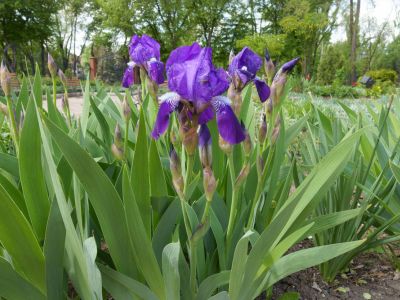Recognizing Fusarium Rot of Iris
Iris basal fusarium is favored by warm, humid conditions. The disease generally attacks the roots first, and then enters the base of the bulb. It can also enter the bulb through cracks or wounds. Iris basal rot is spread by contaminated bulbs or soil, as well as splashing water, wind, insects, or garden tools. The first signs of iris fusarium rot are generally stunted growth and yellowing leaves, often with lesions at the base. The disease may infect entire plants or symptoms may be limited to one side. This disease destroys the roots before penetrating the base of the bulb. As a result, the plant is easily pulled from the soil. The bulbs may look perfectly normal although the base may be shrunken and deformed, and the neck of the bulb may be softened. There may be a clear margin between healthy and diseased tissues. The husk usually turns pale or reddish brown, sometimes with a pinkish or white mass of spores. The rotted husk may remain firmly attached to the bulb.
Treating Iris Fusarium Rot
Purchase only healthy, disease free iris bulbs. Ensure the bulbs are planted in well-drained soil. Avoid overcrowding, space plants apart so they have plenty of air circulation. Be careful not to wound the bulbs when digging or hoeing in the iris bed. Apply a layer of mulch around the bulbs to keep the soil cool and prevent water from splashing on the leaves. Water bulbs carefully, preferably in the morning. Remove and destroy iris bulbs that show signs of damage or disease. Never plant bulbs that show a pinkish white fungus. Keep weeds under control as they often harbor disease pathogens. Keep the plants as healthy as possible. Water regularly, but not too much. The same goes for fertilizer – feed iris plants regularly, but don’t overfertilize, especially with high nitrogen fertilizers, which may foster fusarium rot of iris.
